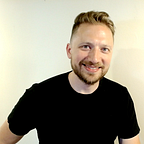Speaker’s Story: Laurie Barth, Software Engineer and Conference Speaker
Technology conference speakers come from a wide range of backgrounds, experience levels, and interests. At CFP Land, we highlight different speakers every week in our Speaker’s Story blog posts.
Tell me about yourself? How did you get into public speaking?
I’m Laurie and I’m a software engineer. I got into speaking for a couple of reasons. In my former life I was an active member of the debate team and did a lot of musical theatre, so audiences don’t scare me. I decided I wanted to be involved in technical speaking in part because I wanted to see more diversity represented on the stage.
What do you like about speaking at conferences?
There is so much to love about speaking.
I like thinking up the talk subject and coming up with something I think is new or interesting that will benefit attendees. While writing talks are a huge time commitment, there is nothing quite like explaining a concept to others to help crystalize it in your mind.
And, speaking is an incredible way to connect with other people outside of your tech silo and/or geographic area. It has also opened up additional career opportunities for me, and has resulted in growing in different directions as well, like writing blog posts and answering interview questions!
3. Do you remember your first conference talk? How did it go?
I do! It was a local first year conference. I think the talk was meant to be 20 minutes or so and I was overly concerned about running short.
It went pretty well, and people laughed at my jokes, but I was far more nervous than I’d expected to be. If you want to judge for yourself the video is online. I really should retool this talk and give it again.
4. How many conferences have you applied to and spoken at?
I looked at my Trello board, and I’ve applied to around 35 conferences over the course of 3 years. I’ve been accepted at 12 and spoken at 9–10 of those.
5. Do you have a pre-talk routine?
I try to arrive in the room as early as I can after the previous speaker, and normally I run the talk through without notes while getting ready that morning. As long as I know I have the cues in my head I’m not worried about any further memorization.
6. What advice do you have for new speakers?
My biggest piece of advice is about content.
The talks that are most engaging to me include stories of failure, they talk about learning something you don’t know and falling down along the way, or they’re a new perspective from an outsider on a specific topic.
This isn’t a hard and fast rule, but I think it’s a great way to think about potential topics and to feel confident being honest with your audience. You’ll be more memorable.
7. Are there any other speakers you look up to? Anyone who’s inspired you?
So so many! I really couldn’t pick so I’ll try and talk about speakers with totally different types of talks.
I love Nicholas Means who takes you through incredibly real stories about disasters and almost disasters and what we can learn from them.
I love Emily Freeman who talks about how the human reactions of all of us manifest themselves in our work and how that can help us be more cognizant of our actions.
I’ve recently discovered some amazing speakers through youtube videos like Philip Roberts who did a great talk on the javascript event loop:
8. Where can readers find out more about you?
I have a website: laurieontech.com (pardon the lack of responsive design, I just migrated to a new framework and it’s a work in progress). I also tweet a fair amount @laurieontech.
If you’re a tech conference speaker, sign up at www.cfpland.com to start getting our weekly newsletter of conference speaking opportunities or email karl@cfpland.com to tell your story. 💌
